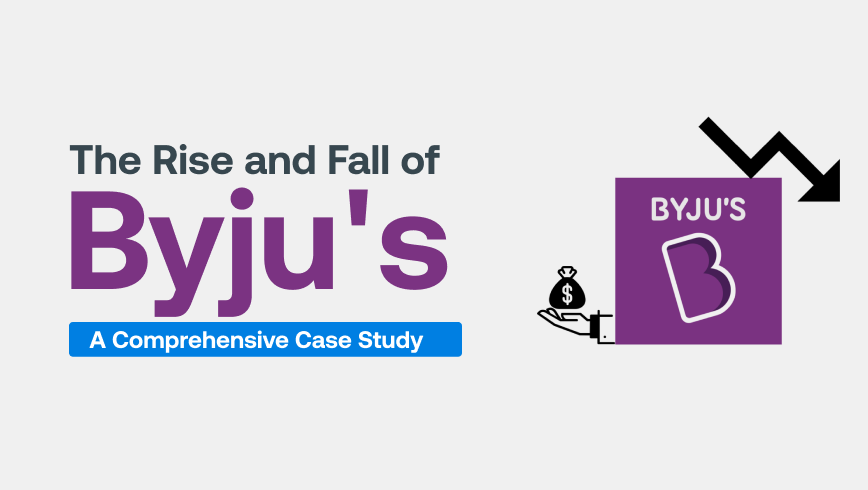From Rising to Downfall
In the dynamic field of educational technology, one company has risen as a titan in India, captivating the nation with its ambitious vision to revolutionize learning was Byju. This company, whose name quickly became synonymous with innovation and accessibility, entered the scene with a bold promise to transform the way education is imparted and received.

Byju’s Early Days
It all began in 2011 when Byju’s entered the educational technology sector with a visionary goal to revolutionize learning. Their rapid expansion quickly captivated the nation with innovative approaches that reshaped how students engage with education. Byju’s did not merely stop there; they strategically partnered with some of the most prominent names in sports and entertainment to amplify their brand presence.
Star-Studded Endorsements
Byju’s enlisted iconic figures such as superstar Shahrukh Khan, cricketer Virat Kohli, badminton player PV Sindhu, and Olympic gold medalist Neeraj Chopra as ambassadors. These partnerships propelled Byju’s to unprecedented heights in the industry. Moreover, their global influence surged when they signed football legend Lionel Messi as their Global Ambassador, a move that significantly bolstered Byju’s valuation to a staggering $22 billion, making it the world’s most valuable EdTech startup in record time.
Impact on Education
Since its inception, Byju’s has continued to innovate within the educational technology landscape. Their platforms have empowered millions of students by offering personalized learning experiences tailored to individual learning needs and styles. Byju’s has also forged strategic partnerships with educational institutions and government bodies, leveraging technology and data analytics to enhance teaching methodologies and student outcomes.
Unraveling Byju’s: A Story of Ascent and Turmoil
In the dynamic world of business, the trajectory of success can sometimes take unexpected turns. Byju’s, once celebrated as a pioneer in educational technology, faced a stark reversal of fortunes in June 2023. As the largest non-founder shareholder, it drastically slashed the company’s valuation to $5.1 billion, a staggering decline of over 75%. This marked the beginning of a tumultuous period for the company.
The Aftermath of Decline
The repercussions were profound and far-reaching. Byju’s was forced to lay off approximately 1,000 employees, underscoring the severity of the downturn. Allegations of financial mismanagement further tarnished their reputation. Reports surfaced that Byju’s parent company, Think and Learn Private Limited, had failed to remit Provident Fund (PF) contributions for many employees, raising concerns about compliance and financial stewardship.
Allegations and Operational Challenges
Moreover, allegations emerged that Byju’s had deducted taxes from employee salaries but had not deposited these funds with the government, purportedly diverting them for other purposes. This raised serious questions about financial transparency and corporate governance within the organization. Adding to their woes, Byju’s faced suspension of their accounts by tech giants Google and Facebook for unpaid advertisement dues, exacerbating their financial predicament.
Customer Discontent and Missteps
One of the most egregious missteps during this period was Byju’s handling of customer refunds. Customers who purchased courses on loan requested cancellations and refunds as per standard protocol. However, instead of processing refunds promptly, Byju’s continued to debit EMIs from their accounts, causing frustration and discontent among their customer base.
Reasons for Downfall:
One significant factor was Byju’s aggressive marketing tactics. While effective marketing is crucial, there exists a delicate balance between persuasive salesmanship and pressuring potential customers. Some parents accused Byju’s marketing personnel of instilling fear about their children’s future in this highly competitive world. These tactics eroded trust and fostered a negative perception of the company.
Byju’s subsidiary, WhiteHat Jr, employed a controversial marketing strategy centered around a child prodigy named Wolf Gupta. They claimed he secured a job at Google for a staggering sum of 1.2 crores, insinuating that children who did not enroll in their courses were jeopardizing their future. However, aggressive marketing was not the sole issue. Byju’s overall strategy and financial missteps also played pivotal roles in their decline.
Byju’s failure to file timely financial reports added to doubts about their stability. Financial difficulties mounted as the company defaulted on a 1.2 billion loan payment. The substantial expenses incurred in signing global brand ambassador Lionel Messi and sponsoring major events further strained their financial standing. The company’s financial performance painted a troubling picture—while revenue remained steady, Byju’s losses skyrocketed from 262 crores to a staggering 4,564 crores in just one year.

